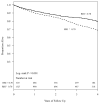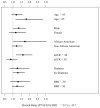Renal resistive index and mortality in chronic kidney disease
- PMID: 26077569
- PMCID: PMC4498966
- DOI: 10.1161/HYPERTENSIONAHA.115.05536
Renal resistive index and mortality in chronic kidney disease
Abstract
Renal resistive index (RRI) measured by Doppler ultrasonography is associated with cardiovascular events and mortality in hypertensive, diabetic, and elderly patients. We studied the factors associated with high RRI (≥0.70) and its associations with mortality in chronic kidney disease patients without renal artery stenosis. We included 1962 patients with an estimated glomerular filtration rate of 15 to 59 mL/min per 1.73 m(2) who also had RRI measured (January 1, 2005, to October 2011) from an existing chronic kidney disease registry. Participants with renal artery stenosis (60%-99% or renal artery occlusion) were excluded. Multivariable logistic regression model was used to study factors associated with high RRI (≥0.70), and its association with mortality was studied using Kaplan-Meier plots and Cox proportional hazards model. Hypertension was prevalent in >90% of the patients. In the multivariable logistic regression, older age, female sex, diabetes mellitus, coronary artery disease, peripheral vascular disease, higher systolic blood pressure, and the use of β blockers were associated with higher odds of having RRI≥0.70. During a median follow-up of 2.2 years, 428 patients died. After adjusting for covariates, RRI≥0.70 was associated with increased mortality (adjusted hazard ratio, 1.29; 95% confidence interval, 1.02-1.65; P<0.05). This association was more pronounced among younger patients and those with stage 3 chronic kidney disease. Noncardiovascular/non-malignancy-related deaths were higher in those with RRI≥0.70. RRI≥0.70 is associated with higher mortality in hypertensive chronic kidney disease patients without clinically significant renal artery stenosis after accounting for other significant risk factors. Its evaluation may allow early identification of those who are at risk thereby potentially preventing or delaying adverse outcomes.
Keywords: cardiovascular diseases; mortality; renal artery obstruction; renal insufficiency, chronic.
© 2015 American Heart Association, Inc.
Figures
Comment in
-
Why does renal resistive index predict mortality in chronic kidney disease?Hypertension. 2015 Aug;66(2):267-9. doi: 10.1161/HYPERTENSIONAHA.115.05690. Epub 2015 Jun 15. Hypertension. 2015. PMID: 26077570 No abstract available.
References
-
- Coresh J, Selvin E, Stevens LA, Manzi J, Kusek JW, Eggers P, Van Lente F, Levey AS. Prevalence of chronic kidney disease in the United States. JAMA. 2007;298:2038–2047. - PubMed
-
- Tonelli M, Wiebe N, Culleton B, House A, Rabbat C, Fok M, McAlister F, Garg AX. Chronic kidney disease and mortality risk: a systematic review. J Am Soc Nephrol. 2006;17:2034–2047. - PubMed
-
- Go AS, Chertow GM, Fan D, McCulloch CE, Hsu CY. Chronic kidney disease and the risks of death, cardiovascular events, and hospitalization. N Engl J Med. 2004;351:1296–1305. - PubMed
-
- Chronic Kidney Disease Prognosis Consortium. Matsushita K, van der Velde M, Astor BC, Woodward M, Levey AS, de Jong PE, Coresh J, Gansevoort RT. Association of estimated glomerular filtration rate and albuminuria with all-cause and cardiovascular mortality in general population cohorts: a collaborative meta-analysis. Lancet. 2010;375:2073–2081. - PMC - PubMed
-
- Doi Y, Iwashima Y, Yoshihara F, Kamide K, Hayashi S, Kubota Y, Nakamura S, Horio T, Kawano Y. Renal resistive index and cardiovascular and renal outcomes in essential hypertension. Hypertension. 2012;60:770–777. - PubMed
Publication types
MeSH terms
Grants and funding
LinkOut - more resources
Full Text Sources
Medical



